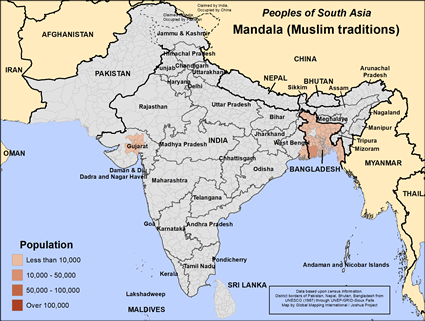Mandala (Muslim traditions) in Bangladesh

Send Joshua Project a photo
of this people group. |

Map Source:
People Group data: Omid. Map geography: UNESCO / GMI. Map Design: Joshua Project
|
| People Name: | Mandala (Muslim traditions) |
| Country: | Bangladesh |
| 10/40 Window: | Yes |
| Population: | 122,000 |
| World Population: | 124,600 |
| Primary Language: | Bengali |
| Primary Religion: | Islam |
| Christian Adherents: | 0.00 % |
| Evangelicals: | 0.00 % |
| Scripture: | Complete Bible |
| Ministry Resources: | Yes |
| Jesus Film: | Yes |
| Audio Recordings: | Yes |
| People Cluster: | South Asia Muslim - other |
| Affinity Bloc: | South Asian Peoples |
| Progress Level: |
|
Introduction / History
The Muslim Mandala people in Bangladesh and India have a background primarily connected to agriculture and small-scale trade. Most live in the Bengali speaking areas of West Bengal and Bangladesh, and they speak Bengali.
What Are Their Lives Like?
The Mandala people live in rural villages and small towns, focusing on farming and local trade. They grow crops such as rice, jute and vegetables. Many also engage in small-scale trading and artisanal crafts.
Their diet includes both vegetarian and non-vegetarian food, featuring staples like rice, lentils, vegetables and fish. Traditional dishes such as macher jhol (fish curry) and bhat (rice) are common in their meals. Weddings among the Mandala are elaborate, involving rituals such as the Nikah (marriage contract), exchange of gifts, and celebrations with music and dance.
What Are Their Beliefs?
The Mandala people practice Islam, predominantly following Sunni traditions. They observe Islamic rituals, including the five daily prayers, fasting during Ramadan, and celebrating religious festivals such as Eid al-Fitr and Eid al-Adha. Their belief system emphasizes values like community service, hospitality, and respect for elders. They honor their ancestors through prayers and gatherings, often at the tombs of Muslim saints.
What Are Their Needs?
The Mandala people need better access to quality education to provide more opportunities for their children. Improved healthcare services are essential due to the limited availability of medical facilities and high rates of preventable diseases. Economic support through modern agricultural techniques, market access, and vocational training can enhance their livelihoods. Infrastructure development, including better roads, clean water supplies, and reliable electricity, will greatly benefit the Mandala community. Addressing these needs will help the Mandala people achieve greater socio-economic stability while preserving their traditional way of life.
Prayer Points
Pray for laborers who will dedicate their lives to seeing the Muslim Mandala people have access to the gospel.
Pray that they would be hungry for truth and in their seeking, they would be drawn by the Holy Spirit to know Jesus.
Pray that the word of the Lord would go forth swiftly and the love of the believers would be contagious, drawing those who are lost to the foot of the cross.